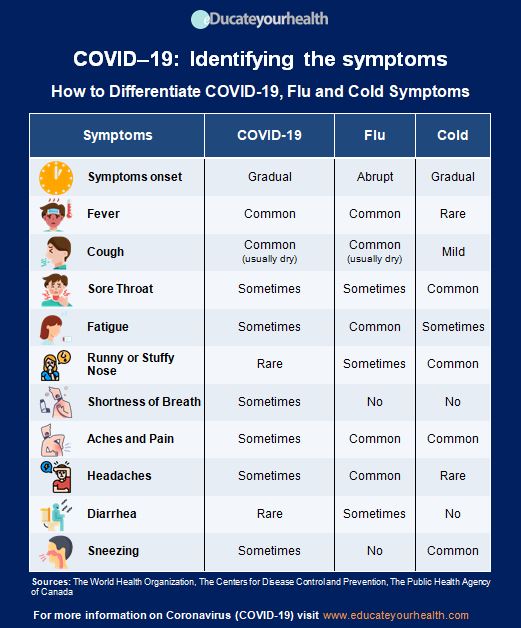COVID-19 Symptoms
Symptoms can develop anywhere between 2- 14 days after being exposed to the novel coronavirus. Reported symptoms can range from mild to severe causing death.
Most common symptoms include:
- Fever
- Cough (usually dry)
- Shortness of breath or difficulty breathing
- Sneezing
- Sore throat
- Extreme tiredness
- Decreased appetite
Less common symptoms are:
- Headache
- Stuffy or runny nose
- Productive cough
- Diarrhea
- Nausea / vomiting
- Unexplained loss of taste or smell reported by some patients
In children, symptoms can be:
- Diarrhea
- Runny nose
- Sore throat
- Lethargy
- Poor feeding
Emergency warning signs for COVID-19 are:
- Trouble breathing
- Persistent pain or pressure in the chest
- New confusion
- Bluish lips or face
If you experience any of these symptoms call 911 and seek immediate medical attention.
Who is at risk of developing COVID-19?
Everyone is at risk of being exposed to the novel coronavirus and developing COVID-19, however, most of the healthy population who contracts it will only develop mild to moderate symptoms.
The risk of developing severe symptoms of COVID-19 requiring hospitalization increases for anyone, regardless of age, that has underlying health issues and are immunocompromised. Those in the high risk category are:
- People 65 yrs and older
- Those living in a nursing home or long-term care facility
- People with chronic lung disease or moderate to severe asthma
- People who have serious heart conditions
- People who are immunocompromised including cancer patients, bone marrow or organ transplant recipients, those with uncontrolled HIV or AIDS, those with immune deficiencies, autoimmune diseases, and those who are on prolonged use of corticosteroids or other medications that lower the immune system
- People who have severe obesity (BMI>40)
- People with poorly controlled diabetes
- People with renal failure
- People with liver disease
How do I know if I have a cold, the flu or COVID-19?
The symptoms of a mild case of COVID-19 are similar to cold and flu symptoms, however, there are some differences. Below is a chart to help you differentiate your symptoms:

When in doubt, call your health professional or your local public health agency, tell them your symptoms and follow their instructions.
Click button below to download symptoms chart.

Your Health Matters
Knowledge is power. Do your research, read and take responsibility for the choices you make for your health.
~Unknown
COVID-19 RESOURCES
COVID-19 Self-Assessment
Are you experiencing any of the following symptoms?
- Severe difficulty breathing (for example, struggling for each breath, speaking in single words)
- Severe chest pain
- Having a very hard time waking up
- Feeling confused
- Lost consciousness
If you have any of these symptoms:
Call a health care professional or your local public health agency, tell them your symptoms and follow their instructions.

Free Downloads

We acknowledge and thank all the health professionals who are on the front lines treating and taking care of all those affected by COVID-19.
The courage and strength you exhibit putting the health and care of others ahead of your own makes you the true heroes of this pandemic.











